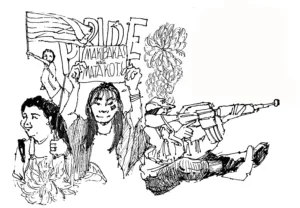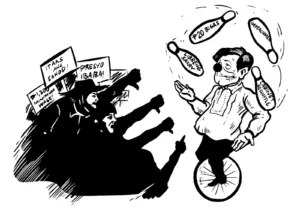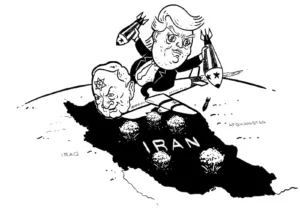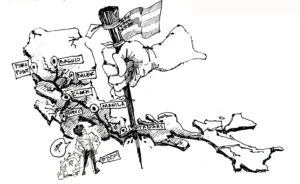
By Jose Maria Sison, NDFP Chief Political Consultant
Assembly for Peace, Quezon City
Dear Peace Advocates,
Thank you for inviting me to your assembly. I wish to discuss recent and current circumstances pertinent to the prospect of resuming the GRP-NDFP peace negotiations and then I shall try to estimate whether such a prospect will be realized before the end of the Duterte regime. I shall also make suggestions pertaining to the role of the peace advocates during and after the Duterte regime.
I. Recent Circumstances Pertinent to Peace Negotiations
Since November 23, 2017, GRP President Duterte had issued proclamations and executive orders (especially Proclamation Nos. 360 and 374 and Executive Order No. 70) to terminate and further prevent peace negotiations between the authorized negotiating panels of the GRP and the NDFP. But on December 5, 2019, he publicly ordered Secretary Bello to meet me in Utrecht in order to explore the resumption of peace negotiations.
As it is the consistent NDFP policy to be open to peace negotiations with the GRP, I readily agreed to meet Secretary Bello. Thus, from December 7 to 9, 2019, Secretary Bello and Nani Braganza held informal talks in Utrecht with a team of the NDFP, including panel chairperson Fidel Agcaoili and senior adviser Luis Jalandoni, myself and a few others. Further informal talks occurred from December 19 to 21.
In the presence of a representative of the special envoy of the Royal Norwegian Government, Katrina Lie Revheim, the following agreements were made as a result of the informal talks:
First: The reciprocal unilateral ceasefire to run from December 23 to January 7 on the mutual understanding that it is a measure of goodwill and confidence-building to pave the way for the resumption of peace negotiations as well as the soonest release by the GRP president of the sick and elderly political prisoners, especially the NDFP consultants, on humanitarian grounds and in the spirit of Christmas and the New Year.
Second: The informal meeting on the second or third week of January 2020 to pave the way for the first formal meeting to resume the peace negotiations with the following tasks, to reaffirm the joint agreements since 1992 and to supersede the presidential issuances terminating and preventing the peace negotiations and to set the agenda for further formal meetings for the finalization of the Interim Peace Agreement (IPA), previously drafted jointly by back-channel teams of the GRP and NDFP.
The Interim Peace agreement is a package of agreements on a) general amnesty and release of all political prisoners, b) approval of the articles of Comprehensive Agreement on Social and Economic Reforms (CASER), on 1) agrarian reform and rural development and 2) national industrialization and economic development, and c. coordinated unilateral ceasefire agreement.
Third: I agreed to meet Duterte in April in Hanoi after the mutual approval of the IPA and to meet him in the Philippines after the mutual approval of CASER.
On the whole, on a nationwide scale, the reciprocal unilateral ceasefire ran successfully from December 23, 2019, to January 7, 2020, despite a few incidents which became the subject of publicized complaints from the direction of the GRP and NDFP. These complaints ought to be submitted to the Joint Monitoring Committee under the Comprehensive Agreement on Respect for Human Rights and International Humanitarian Law (CARHRIHL).
It should be noted that not a single political prisoner was released on humanitarian grounds in the spirit of Christmas and the New Year, contrary to expectations of the NDFP Negotiating Panel, the political prisoners and their families.
II. Current Circumstances Pertinent to Peace Negotiations
Even before the ceasefire ended, certain GRP officials (including national security adviser Esperon, Defense Secretary Lorenzana, DILG secretary Año, OPAPP secretary Galvez and ultimately the newly appointed AFP chief of staff Santos) took turns in opposing the resumption of the peace negotiations between the duly authorized panels of the GRP and the NDFP.
They harped on the following points:
1. They can destroy the CPP and NPA before the end of the Duterte regime despite the failure of all previous regimes to destroy the people’s revolutionary movement and the repeated failure of the current Duterte regime to comply with its deadlines for destroying said movement.
2. They oppose peace negotiations in a neutral venue abroad but favor negotiations for the surrender of the CPP, the NPA and entire revolutionary movement to the unchanged tyrannical regime in a Philippine venue under the control and manipulation of said regime and its armed minions.
3. They have rendered peace negotiations at the national level unnecessary and superfluous because they are already destroying the revolutionary movement and are successfully staging fake localized peace talks, despite the glaring fact that all organs of the CPP and commands of the NPA at all levels have publicly rejected and condemned such fakery.
4. They are supposedly making their own reforms and consider as unnecessary the social, economic and political reforms proposed by the NDFP and those already agreed upon by the GRP and NDFP negotiating panels in order to realize full independence, democracy, social justice, and all-round development and they are most vehemently against genuine land reform and national industrialization.
5. They are satisfied with and enjoy the escalating conditions of oppression and exploitation under the semi-colonial and semifeudal ruling system of big compradors, landlords and corrupt bureaucrats who are servile to the imperialist powers, their banks and monopoly firms.
Esperon and Galvez have been the most vicious in opposing the CASER, which has long been considered by the broad masses of the people like the meat or even the heart and soul of the peace negotiations. They use disinformation and outright lies to deny the hard work and achievements of the GRP and NDFP negotiating panels and their reciprocal working committees on social and economic reforms in negotiating and jointly drafting provisions of CASER.
They misrepresent CASER as the sole product of the NDFP and accuse the NDFP of being one-sidedly responsible for formulating the provisions already agreed upon by the reciprocal working committees of the GRP and the NDFP. In effect, they are sabotaging the resumption of the peace negotiations and the prospect of formalizing the Interim Peace Agreement, which carries the mutual approval of the articles on land reform and national industrialization in CASER.
The statement of the NDFP Reciprocal Working Committee on Social and Economic Reforms (RWC SER) titled “Military Hawks Sabotage Peace Talks and Oppose Social and Economic Reforms”, dated January 14, 2020, gives you an accurate picture of the process of negotiating and drafting the CASER and debunks the false claims of Esperon and Galvez who are hell-bent on sabotaging the peace negotiations and carrying an all-out war against the people and the revolutionary movement.
President Duterte has allowed his subordinates with a militarist hawk mindset to speak publicly against the resumption of the peace negotiations and against the negotiations on CASER. He has so far disallowed his civilian peace emissaries, Bello and Braganza, from coming to Utrecht in the second or third week of January as promised in order to engage in an informal meeting to prepare the formal meeting for the resumption of peace negotiations.
On Friday, January 10, 2020, Duterte spoke to the press that he would like to have a one-on-one meeting with me in Manila before the resumption of the peace negotiations. I have refused the invitation in the following terms:
The repeated offer of Duterte for me to have a one-on-one meeting with him in Manila is done in bad faith. It is either a malicious scheme to put me in a lethal trap or an equally malicious maneuver to prevent peace negotiations upon rejection of his offer by me and the NDFP as an unacceptable precondition.
There are three reasons why Duterte is being malicious about his offer of a one-on-one meeting in Manila:
First, he wants me to drop the legal protection that I have under the Refugee Convention and Article 3 of the European Convention on Human Rights and to put myself under the control and disposition of his butcher regime upon my arrival in Manila.
Second, he wants me to violate my principles by submitting and surrendering myself to the tyrannical regime and to the actions that he has taken to terminate and prevent the peace negotiations between authorized panels of the GRP and NDFP.
Third, he wants to preempt the absolutely necessary formal meeting that has to be held in a neutral venue abroad in order to resume the peace negotiations by reaffirming the joint GRP-NDFP agreements since 1992 and by superseding the presidential issuances that he has made to terminate and prevent peace negotiations.
Duterte is making the fake offer of a one-on-one meeting in Manila as an unacceptable precondition that invites rejection by me and by the NDFP and thereby prevents the peace negotiations. I do not think that he actually believes that I would take his bait or he is unintelligent enough not to appreciate my ability to discern what is mere trickery from him and his military advisors.
III. Prospects of Resuming the Peace Negotiations
In view of the foregoing circumstances, I do not think Duterte is serious about resuming the peace negotiations. The prospect of resuming the peace negotiations before the end of the Duterte regime is close to nil or already nil.
There is no sign from him whatsoever that peace negotiations are to be resumed by reaffirming the joint agreements made by the GRP and NDFP since 1992, by superseding the presidential issuance that has terminated and prevented peace negotiations and by taking up the Interim Peace Agreement.
Previously, when I responded positively to his offer of resuming the peace negotiations on December 5, 2019, I gave him the benefit of a doubt that he would be interested in leaving a legacy that is not as ignominious as it has already taken shape. So far, he has not done anything to assure the people that his regime is not treasonous, tyrannical, genocidal, corrupt and mendacious.
It appears that he still overestimates his capabilities of clinging to power and that he does not need any peace negotiations with the NDFP. He continues to let his political agents in Congress push charter change for installing a fascist dictatorship as Marcos did in the past or for choosing a successor that will protect him from possible prosecution for human rights violations, plunder, and other grave crimes.
It is absolutely clear that Duterte is responsible for terminating and preventing peace negotiations. To him belongs the responsibility for accepting or refusing the consistent openness of the NDFP for peace negotiations.
By refusing to negotiate with the NDFP, it is absolutely clear that he is fixed on pursuing his all-out war against the Filipino people and their revolutionary forces. It is therefore entirely just for the sovereign people and their revolutionary movement to defend themselves and wage all forms of struggle against the Duterte regime.
But despite the counterrevolutionary violence, arrogance, and intransigence of the Duterte regime, the NDFP remains open to resuming the peace negotiations. It holds the view that peace negotiations might reduce or stop the human rights violations being perpetrated by the regime or might even lead to substantial reforms that contribute to laying the basis for a just peace.
But of course, time is fast running out for the Duterte regime to make agreements and implement these. It is now in its twilight years if the regime respects the 1987 Constitution of the GRP and does not amend it to install a fascist dictatorship. But I think that there is enough time to make CASER and implement it to a sufficient and dramatic extent before the Duterte regime ends if Duterte can give up his scheme of fascist dictatorship and can prevail upon his anti-peace and anti-CASER military subordinates not to sabotage the efforts to resume the peace negotiations.
What can the peace advocates do in the face of the current circumstances and what I estimate as to the dismal prospect for resuming peace negotiations before the end of the Duterte regime? I think that it remains their moral duty to persevere in the noble task of peace advocacy and to try to persuade or prevail upon the Duterte regime to engage the NDFP in peace negotiations. Most important of all, peace advocates must work to unify the people on the necessity of addressing the roots of the armed conflict and laying the foundation for a just peace through economic, social and political reforms agreed upon in the peace process.
Like the NDFP, the peace advocates cannot do anything to persuade the Duterte regime to negotiate if for whatever reason it refuses all the way to its very end. But the work is done and agreements made in previous negotiations since 1992 and the continuance and intensification of peace advocacy keep open the prospect of peace negotiations if not in the time of the Duterte regime, in the time of the next regime.
The previous achievements, in the form of agreements and accumulated experience and expertise in peace negotiations, remain on record and are not lost. In the future, they shall be the foundation for renewed peace negotiations between the NDFP and a new regime that is truly determined to strive for a just peace through economic, social and political reforms that address the roots of the armed conflict. Thank you.











